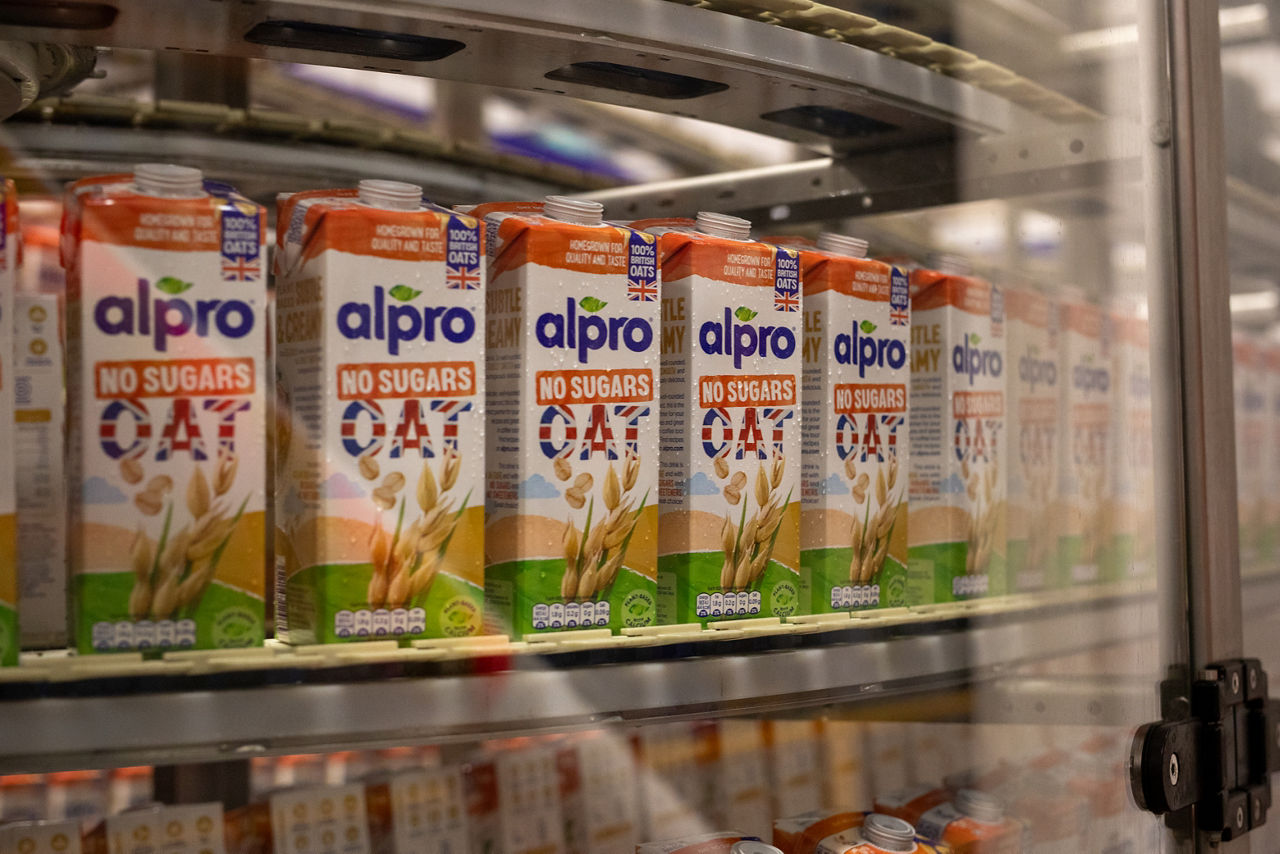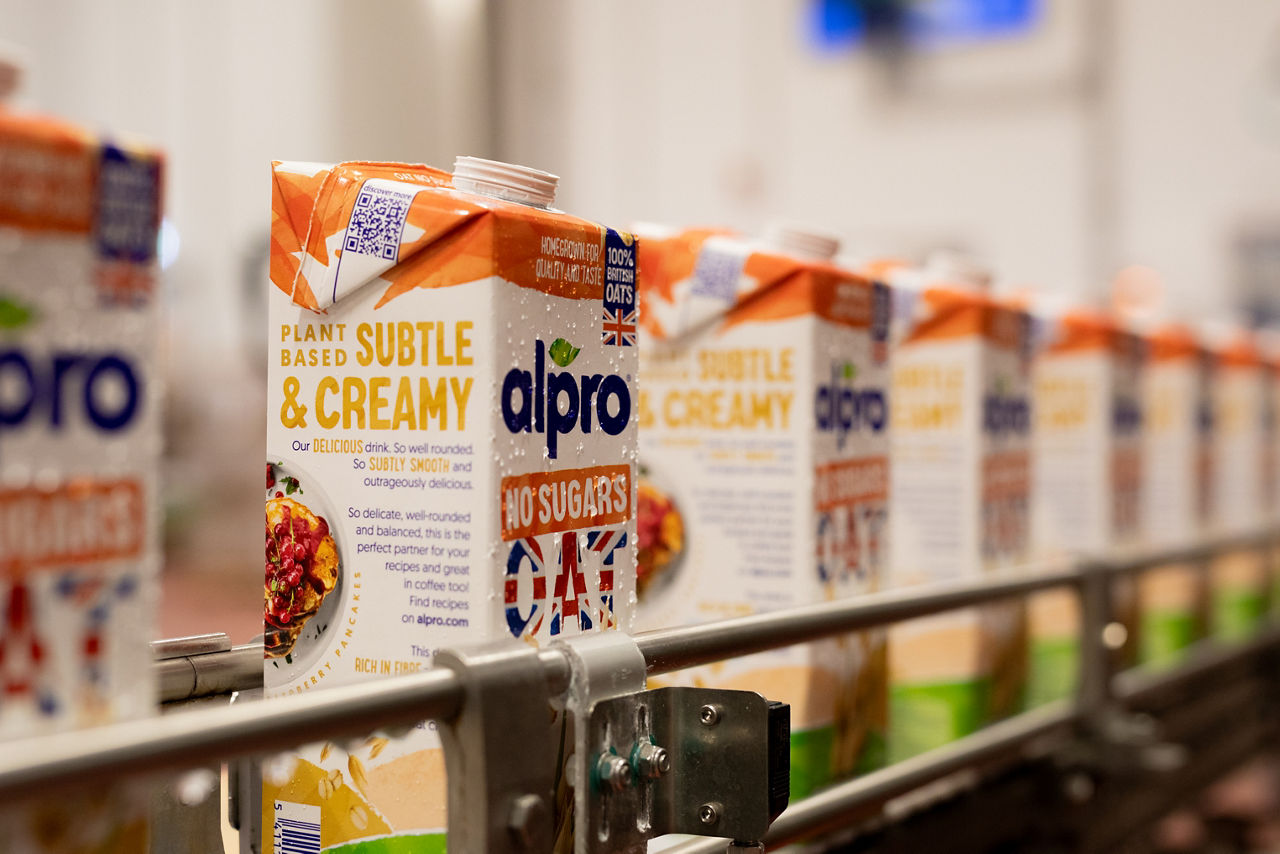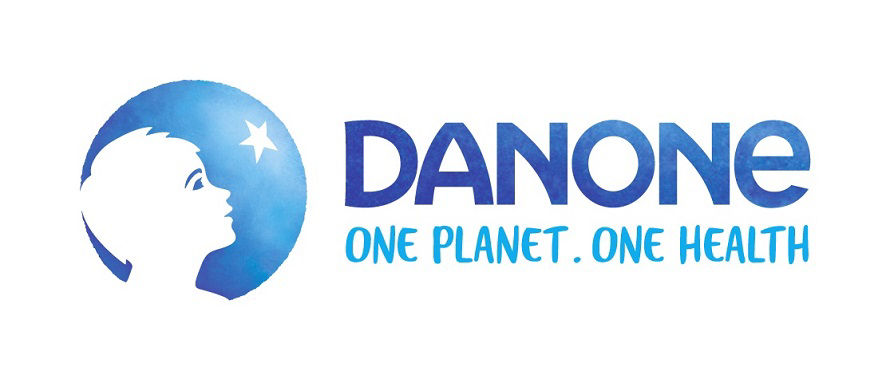
Alpro invests locally to make its most popular oat drink from 100% British Oats for the first time, sourced directly from British farmers.
Multi-million-pound investment in the UK from parent company Danone reinforces its dedication to plant-based products.
Just 1%¹ of oat drink sold every day in UK was previously guaranteed to be from British sources.²
Expansion showcases Alpro’s dedication to offering consumers tasty and healthy³ plant-based products, homegrown for quality and taste.
Leading plant-based brand Alpro has announced a major investment in the UK to allow its most popular oat drink to be made from 100% British Oats for the first time, sourcing its oats directly from British farmers.
The 100% British Oats drink is the result of a multi-million-pound investment in the UK by parent company, Danone, in a drive to support local farming and bolster its plant-based offering. It builds on Alpro’s previous £41 million investment in its facility in Kettering, which saw the installation of new equipment to reduce energy consumption and cut CO2 and water usage.
Oat drinks are continuing to grow in popularity in the UK, with sales climbing to more than £275 million - up from £155 million five years ago.4 This year, oat drinks make up two-fifths of all plant-based drink sales, up from a quarter five years ago,5 amounting to half a million litres of oat drink sold every day in the UK.2
Despite this boom, until now, only 1%1 of oat drink sold in the UK has been guaranteed to be from 100% British oats. As the leading plant-based brand, Alpro’s investment will significantly increase the percentage of British oats in the ever-growing oat drink market, while giving shoppers greater opportunity to buy locally sourced oat drinks.
Locally sourced from field to fridge, mostly from farmers within 80 miles of the “Navara” Oat Mill - also in Kettering - the changes in oat sourcing and production process will significantly cut food miles. And with oats traditionally used for porridge oats, cereals and flapjacks, the investment gives farmers new avenues for their crops. Some 58 million litres of the British Oat Drink are planned to be produced annually in Kettering, equating to a quarter of the site’s production of plant-based drinks.6

The oat drink is available now in an “original” and “no sugars” version. The new recipe is designed to be naturally low in saturated fat, whilst also being high in fibre and enriched with calcium, iodine and vitamins D2 and B2. It comes after research found that half of plant-based shoppers are driven by health.7
Jon Ruberry, Category Director, Plant-based, at Danone UK & Ireland, said: “We continue to see a big appetite amongst shoppers for healthy, plant-based products, especially for ‘flexitarian’ shoppers looking to add variety to their diets. It is also clear that oat-based drinks are increasingly popular with consumers, a trend that is here to stay. This expansion is a key part of our ambition to bring greater choice to supermarket shelves, providing a locally sourced product and a nutritious3 new recipe that we think shoppers will love.”
James Mayer, President, Danone UK & Ireland, said: “Health is at the heart of everything we do, and we work to offer healthier nutrition to consumers in the most sustainable way possible.
“As a pioneer and global leader in plant-based nutrition, plant based drinks are a key part of our strategy to boost growth by focusing on developing products that deliver on both health and taste. This significant UK investment in manufacturing from home grown oats is an exciting step forward and a great demonstration of how we’re innovating to deliver healthy and tasty food & drink sustainably.”
James Skidmore, Managing Director, Navara Oat Milling, said: “The rise in the use of plant-based food ingredients has certainly brought changes to the farming industry – however, this exciting new investment by Danone has opened up more opportunities for oat famers to broaden the products they produce and markets that they grow for. When businesses back British agriculture, famers have more options for their crops, leading to increased resilience and potential for growth.
“The investment will boost capacity and production at the Navara Mill, bringing substantial benefits to the local community both in Kettering, and further afield.”
Navara is owned by grain and agronomy business Frontier Agriculture, alongside farmer-owned co-operative Camgrain. Frontier works with its oat farmers to supply the mill, providing expert advice through its team of agronomists and a range of products and services which help them grow the crop sustainably.
NOTES TO EDITORS
1 1.3% - Value sales on brands that claim British Oats, 26 wks 28-12-24, Circana, all outlets and discounters.
2 Half a million litres, based on Circana figures up to 25 January 2025.
3 Alpro oat drink is a source of calcium, needed for the maintenance of normal bones. A varied, balanced diet and healthy lifestyle is recommended for good health.
4 Oat milk sales grown to over £275m from just over £155m 5 years ago, Circana.
5 Accounts for 39% of all plant-based milk sold, up from 25% 5 years ago, Circana, 25 January 2025.
6 195 million litres, based on 2024 figures.
7 Shopper Study with Kantar in March 2024 with 1307 shoppers.
About production method
The oats are processed at Navara Oat Mill in Kettering before heading to the neighbouring Alpro factory, which has rolled out a new innovative production method to make the recipe. This sees the oat grains ground to flour then blended with water and other ingredients like fibre and vitamins B2 & D2, resulting in the new, great tasting healthy3 recipe.
About Navara
Navara is jointly owned by Frontier Agriculture, a crop production and grain marketing company that supplies all oats processed at the plant via growers in the surrounding region; and Camgrain, a farmer-owned cooperative.
The site of the mill, alongside Camgrain’s Advanced Processing Centre in a key arable region between Corby and Kettering, ensures the minimising of food miles. Excellent transport links provide good access not only to oat growers but also to key food and drink manufacturers who use cereal-based ingredients.
